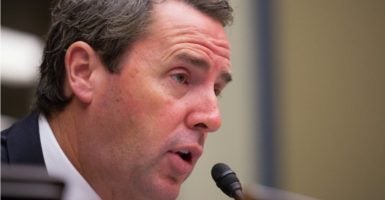Freshman Rep. Mark Walker, R-N.C., wants to be chairman of the Republican Study Committee, and he’s hawking his brand of “effective conservatism” to make his pitch why he should lead the largest conservative conference in Congress.
In his first sit-down interview since formally announcing his candidacy Tuesday afternoon, Walker told The Daily Signal he envisions a bolder and more active RSC during next year’s 115th Congress.
“Effective conservatism for the RSC has to be more than just awareness and intention. There have to be action steps,” the North Carolina representative said. “That’s how we bridge the gap, to make our goals into something more than just talk.”
The rookie representative said that requires the RSC to function as a conservative clearinghouse rather than an echo chamber.
“RSC has the opportunity to be the filter for whatever leadership or outside groups present us with,” Walker said. “We are the think tank. We are the process. We purify legislation to make sure we deliver on the promises we made to the American people. That’s why it matters.”
Walker has only been in Washington for 21 months but he’s quickly become popular among the many warring factions of the GOP conference, often working closely with leadership and hard-line conservatives.
Conservatives praise him for forcing leadership to allow consideration of an amendment allowing states to opt out of federal education requirements. The Republican establishment applauds him for his work to reform the party’s approach to poverty.
“You can get the immediate attention—that old adage that the squeaky wheel gets the grease—by throwing a temper tantrum every time you don’t get your way,” Walker said. “But long-term success is built by the relational side.”
To be effective as a committee, Walker said the Republican Study Committee should position itself somewhere in between the aggressive Freedom Caucus and the establishment of House leadership.
A Baptist minister turned congressman, Walker said he expects an RSC congregation under his watch would work closely with both groups while being prepared to split with either at any moment.
“I hope there are times [RSC] can lock arms with [the House Freedom Caucus] and accomplish some wonderful goals,” Walker said.
Several of the RSC’s 176 members also belong to the more nimble and aggressive 40-member Freedom Caucus.
“If there’s an overreach by leadership that we feel is crossing the line,” he added, “there are going to be times where RSC will have to say, ‘No, this is as far as we go.’”
Walker’s ambitious bid to succeed current RSC Chairman Bill Flores, R-Texas, comes as the committee finds itself in the middle of some of the most contentious fights in Congress.
The Republican Study Committee has pushed for steep cuts to spending and a rebuttal to the White House’s transgender school bathroom directives—positions much farther to the right than those staked out by House Speaker Paul Ryan, R-Wis.
If elected RSC chairman, Walker would have a direct line to leadership along with the chairmen of the Freedom Caucus and centrist Tuesday Group, the two other major voting blocs in Congress.
Some members of the Freedom Caucus have been flirting with the idea of an exodus from the RSC. If they do not pay $5,000 in annual dues, they won’t be able to vote in the Nov. 17 chairman race.
The impact of any exodus could be muted, though. Walker is currently running unopposed.
































